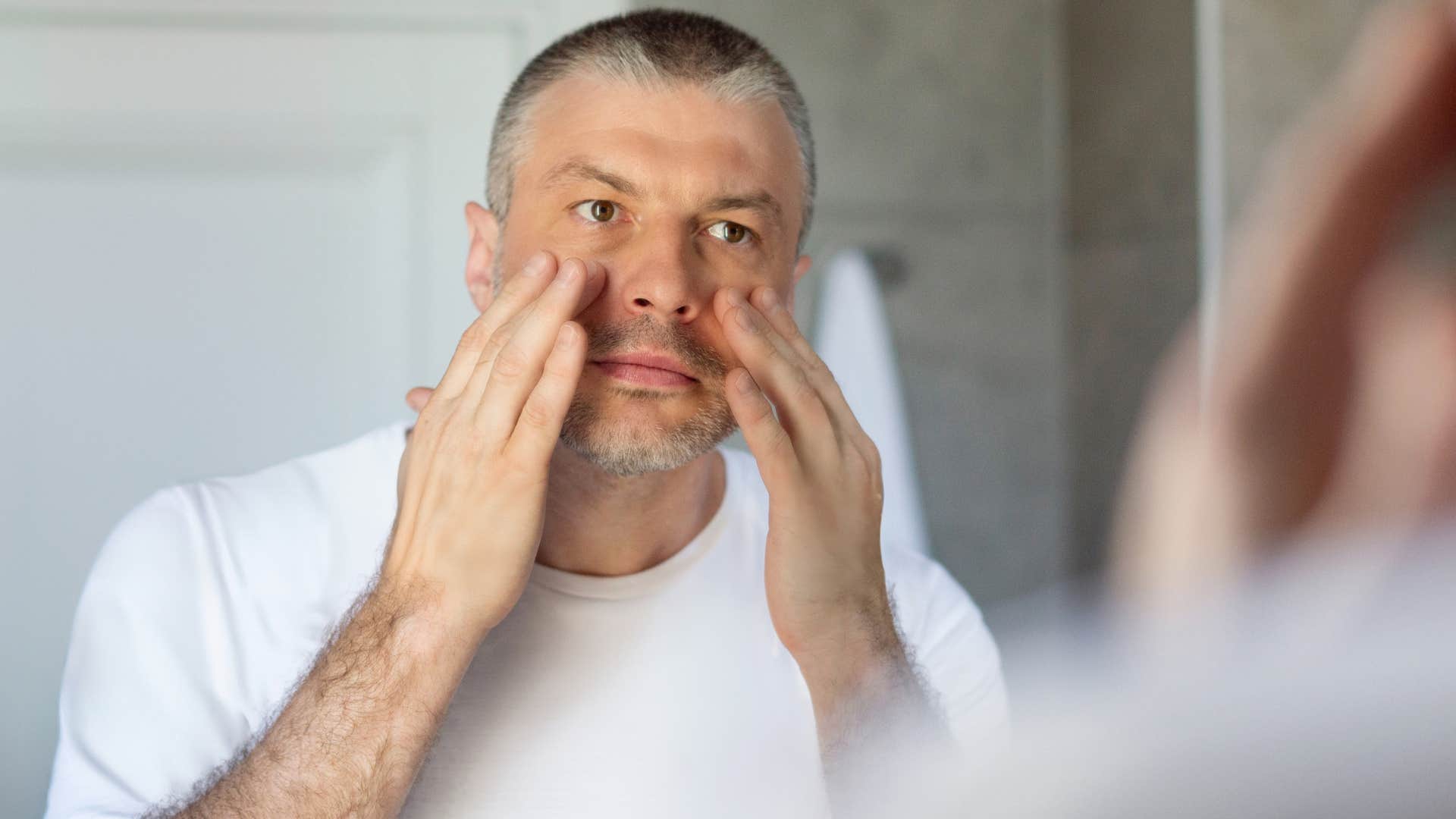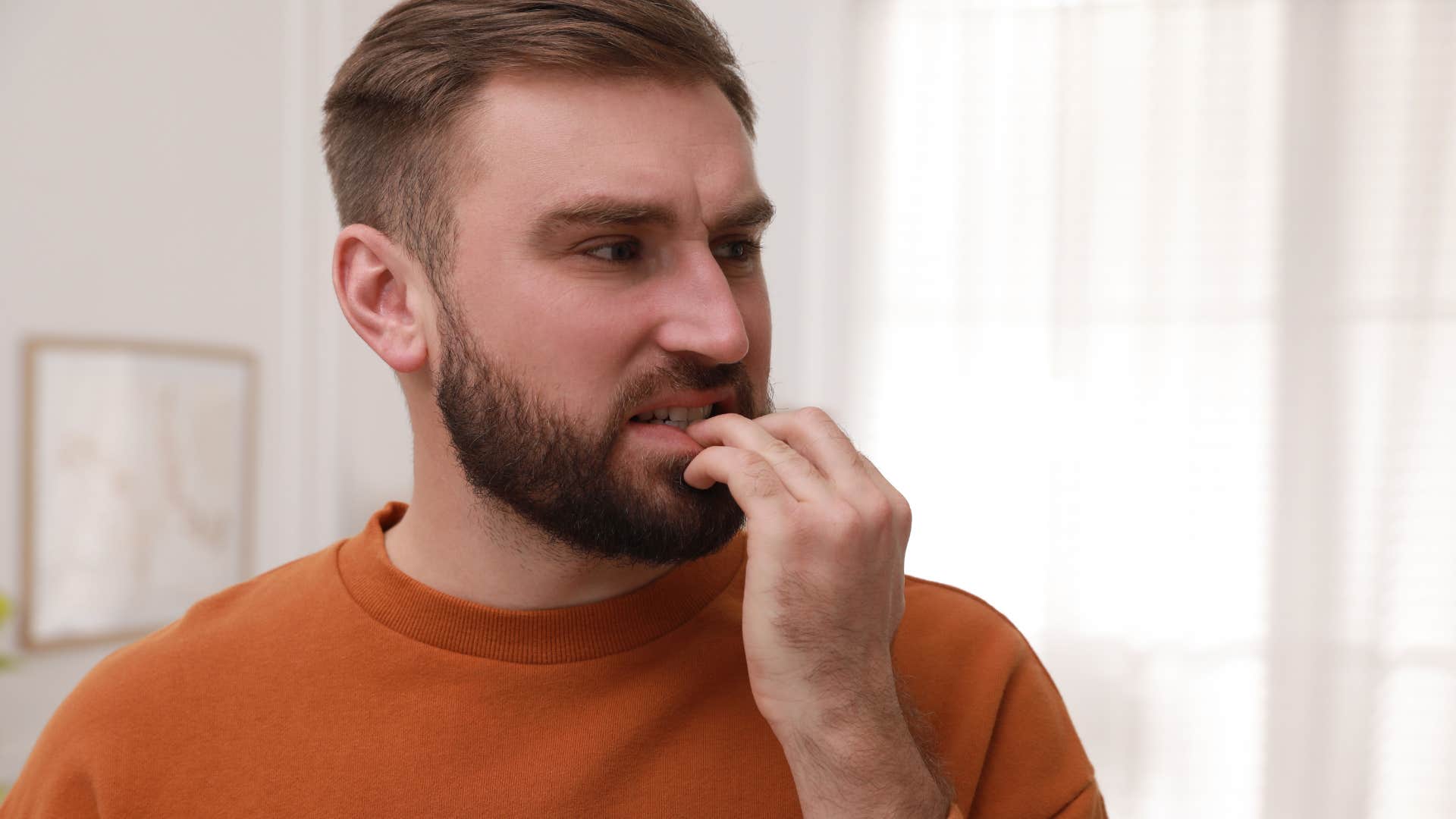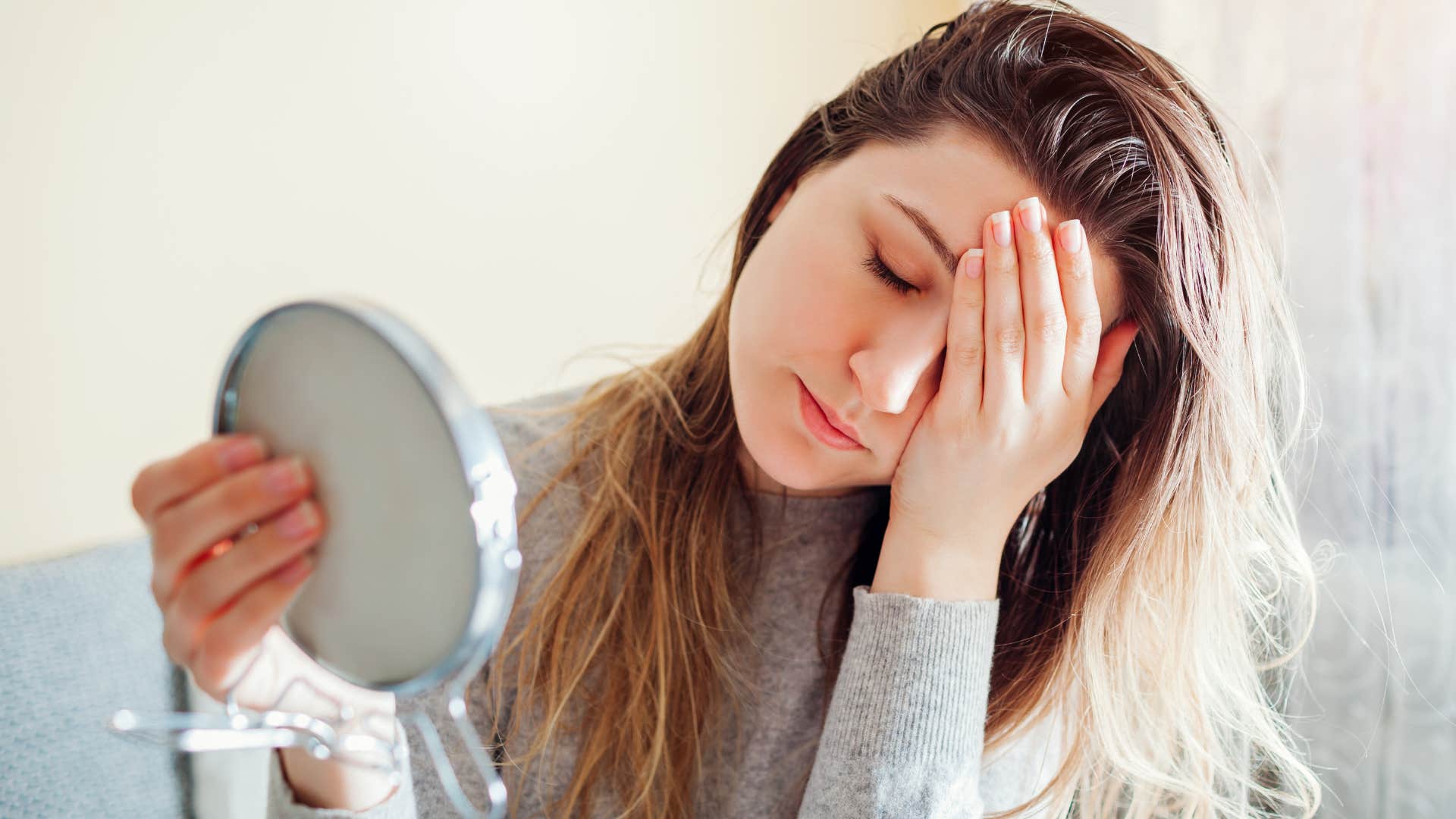If You Notice These 11 Things About Someone's Appearance, They're Struggling More Than They Admit
Don't shrug off these things as laziness.
 Halfpoint | Shutterstock
Halfpoint | Shutterstock A person's appearance is often one of the first things you notice when they're dealing with chronic stress or a mental health condition — largely because changes in self-esteem and personal hygiene play a role when someone is experiencing inner turmoil, according to a study from SAGE Open. From wearing non-personal clothing to not keeping up with grooming, if you notice these things about someone's appearance, they're struggling more than they admit.
People experiencing depression are more likely to struggle with keeping up solid hygiene practices, but there are a number of other struggles — from stress, to relationship problems, and even identity issues — that can also predict someone's appearance and general demeanor. So, if you notice these things in a loved one, but haven't heard them ask for help or vent about their struggles, consider it a warning that they need support.
If you notice these 11 things about someone's appearance, they're struggling more than they admit
1. Dark circles
 fast-stock | Shutterstock
fast-stock | Shutterstock
According to experts from Stanford Medicine, sleep and mental health are inherently linked, with mental health struggles predicting a person's quality of sleep and sleep deprivation further exacerbating that internal turmoil.
Another study from Dialogues in Clinical Neuroscience found that for people experiencing depression, sleep struggles are one of the most common symptoms — whether that's being unable to fall asleep, stay asleep, or get the duration of rest they need every night.
That's why dark circles or a clearly fatigued appearance are both signs that someone may be struggling more than they admit. Even if it's not a diagnosed mental health struggle or disorder, things like chronic stress, burnout, and emotional exhaustion can all spark similarly profound consequences.
2. Changes in weight
 New Africa | Shutterstock
New Africa | Shutterstock
If you notice someone's weight has drastically changed in a short amount of time, it could be a sign that they're struggling more than they admit. Of course, there are a number of situations where a person's weight could fluctuate that have nothing to do with their mental health, but in some cases, it's an indicator of internal issues sparked by stress or mental health changes.
According to a study from the Journal of Affective Disorders, many people experiencing depression struggle with weight gain over the course of a decade, but in other cases, changes to their physical appearance and weight are more profound and quick.
3. Unkempt hair
 lukas_zb | Shutterstock
lukas_zb | Shutterstock
Many people misguidedly associate people struggling with their mental health as being "lazy," largely because of struggles with energy levels and personal hygiene. Whether it's unkempt and unbrushed hair or wearing sweats every day, the consequences of foregoing daily tasks are often rooted in fatigue, not laziness.
A study from Psychiatry Research Communications found that people experiencing depression also experience worsened executive function, making the most basic daily tasks like showering, getting out of bed, or doing chores much harder than they seem. So, if you notice these things about someone's appearance, they're struggling more than they admit, so be careful who you choose to judge.
4. A forced smile
 Perfect Wave | Shutterstock
Perfect Wave | Shutterstock
Although laughter and smiling have been proven to subtly boost mood and mental health, they're more powerful when they're natural and come from true excitement or joy. So, if you notice someone is consistently forcing a smile or laughing without true happiness underneath, chances are they're struggling with internal dilemmas and turmoil more than they admit.
For some, forcing a smile or being fake positive is a means to protect other people from their pain. They may be struggling with isolation or self-esteem issues and are afraid that their emotional struggles will uncomfortably burden others, so they instead suppress them and use laughter to cover up their pain.
5. Chewed nails
 New Africa | Shutterstock
New Africa | Shutterstock
According to a study from the International Journal of Women's Dermatology, chewed nails are often a sign of psychiatric and mental health issues that spark a range of dental health and general sanitary consequences. Whether it's anxiety, nervousness, or chronic stress, someone who is consistently relying on the practice of biting their nails to self-soothe may be struggling more than they admit.
Similar to other practices that assist struggling individuals in coping with and suppressing their complex emotions, nail biting is often noticeable, whether you're around someone in a stressful situation or simply noticing their hands.
6. Constant fidgeting
 Josep Suria | Shutterstock
Josep Suria | Shutterstock
Fidgeting is often a way for people to relieve stress, whether they're aware of the action or not, according to a study from Research in Development Disabilities. Considering it tends to be a relatively unharmful practice, it serves as one of the healthier ways people deal with complex emotions and internal struggles.
However, if you notice someone is constantly fidgeting and moving around, they're probably struggling with stress or anxiety more than they admit. It's normal to deal with a typical amount of stress, but when it starts to consume you, change your appearance, and make it harder to genuinely connect with others, that's a red flag.
7. Greasy hair
 Mariia Boiko | Shutterstock
Mariia Boiko | Shutterstock
People who bathe every day, get enough sleep, and take care of themselves with other personal hygiene practices are often happier than those who don't, according to a 2012 study. However, a lack of bathing isn't usually a cause of mental health concerns, but rather one of the more alarming consequences of dealing with emotional turmoil.
Struggling with motivation, energy, and executive function, even the most basic tasks like bathing or showering become impossible for someone experiencing depression or chronic stress. So, not only are they facing the emotional and internal dysregulation of their mental health crises, they're also faced with the subtle health consequences of not leveraging personal hygiene for support.
8. Shaky hands
 voronaman | Shutterstock
voronaman | Shutterstock
If you notice things like shaky hands about someone's appearance, they're struggling more than they admit. Of course, there are other reasons why someone may be physically shaky — from age, to other health disorders, and even a lack of nutrition — but in conjunction with some of these other signs, it could be a red flag.
Especially alongside other sleep issues, anxiety, or an excessive caffeine intake, you may notice a person's shaky hands more often than normal. Even if you don't realize it, the way our body acts and navigates everyday life is tied to how we're feeling inside, including mentally and emotionally.
9. Not wearing their typical clothes
 DukiPh | Shutterstock
DukiPh | Shutterstock
Our clothing choices are inherently rooted in our mental well-being. For example, someone with a strong sense of self and inner confidence may be more likely to wear eccentric clothes that help them to express themselves. However, if someone is constantly struggling with depression or anxiety — losing sleep and feeling unlike themselves — they may be less inclined to wear clothes that they'd otherwise love.
So, if you notice these things about someone's appearance, it could be an innocent change of style or time, but it could also be a sign that they're struggling more than they admit.
10. Blank expressions
 PeopleImages | Shutterstock
PeopleImages | Shutterstock
Whether it's rooted in chronic stress from a job, a toxic relationship, or mental health struggles, many people who face emotional exhaustion and fatigue struggle to keep up. Their brains are so overwhelmed by trying to cope with complex emotions, discomfort, and stress that things like keeping an engaged face during conversation or completing basic tasks seem impossible.
If you notice someone around you consistently has a blank expression on their face or is zoning out while you're talking, they're probably struggling more internally than they admit.
11. Always covering up
 Krakenimages.com | Shutterstock
Krakenimages.com | Shutterstock
Many people who feel internally overwhelmed or insecure may physically close down to protect themselves. Whether that's isolating from a group, wearing a lot of clothing, or even sitting with a pillow in their lap, the comfort of closeness and smallness is their means of coping.
So, if you notice a person is always covering themselves up or trying to use clothing as a barrier to discomfort, chances are they're struggling more than they admit.
Zayda Slabbekoorn is a senior editorial strategist with a bachelor's degree in social relations & policy and gender studies who focuses on psychology, relationships, self-help, and human interest stories.

